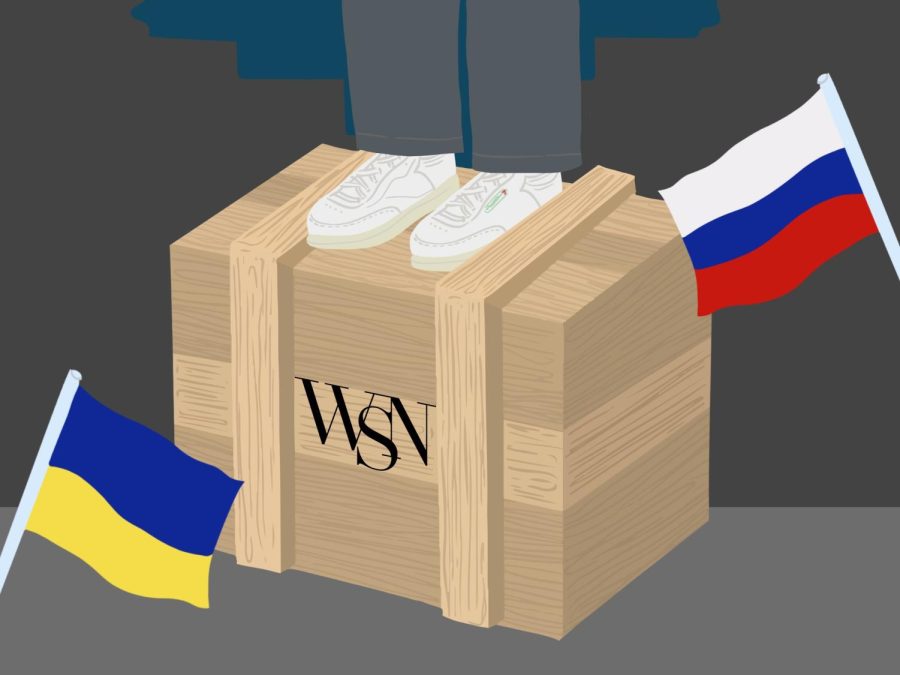The Soapbox: Civilians evacuate Ukraine, protests erupt in Russia
The Soapbox is a weekly column by WSN’s news desk examining the major developments in world news and rounding up the stories we think are worth the read this week. Global consciousness for a global university.
The Soapbox is a weekly news column rounding up stories worth reading for a global university. (Staff Illustration by Susan Behrends Valenzuela)
February 25, 2022
Russian President Vladimir Putin announced on Feb. 24 a Russian “military operation” in Ukraine. Putin said the operation aims to accomplish the “demilitarization and de-Nazification” of the country. Ballistic missile explosions were reported near Ukraine’s capital Kyiv and other cities early that morning.
In an effort to avoid war with Russia, Ukrainian President Volodymyr Zelenskyy called for peace and respect for sovereignty in building a future for both nations. Explosions and attacks have been reported in more than a dozen Ukrainian towns as Russian military forces invaded Ukraine.
In urban areas, Ukranians attempt to evacuate
Air raid sirens sounded throughout Kyiv and Lviv, prompting many residents to hide in metro stations and underground shelters. Long lines formed at ATMs, grocery stores and bus stations as people attempted to prepare for shortages and evacuate to safer areas of the country.
Zelenskyy declared martial law on Feb. 24, mandated that men ages 16-80 must stay in Ukraine to fight, with some Ukrainians abroad re-entering the country to support the defense efforts.
Lines have also reportedly formed at eastern Ukraine gas stations as cars prepare to escape to rural towns. Multiple highways that lead into Kyiv have experienced traffic jams due to high volumes of people fleeing the city.
Ukraine, Moldova and regions of several bordering countries have closed their airspaces to commercial flights as of Feb. 24. Ukrainian government officials reported that explosions occurred at multiple airports near Kyiv. Passengers and staff have allegedly started evacuating from the Boryspil International Airport in Kyiv, and the Russian military is said to have taken the Antonov airport. A cruise missile reportedly hit another international airport in Ivano-Frankivsk.
Some families took shelter in basements shortly after reports of explosions, according to a tweet by Luke Harding, a reporter for the Guardian.
An apartment complex in Kharkiv was reported to have been hit by an airstrike which resulted in the death of a young boy. As of Feb. 24, There are currently reports of more than 40 Ukrainian soldiers killed in the conflict.
In bordering countries, preparations begin for a refugee crisis
Ukraine’s population of nearly 44 million is one of the highest in Europe, and thousands of refugees have already fled in order to escape the Russian invasion. Due to heavy road traffic across the country, some refugees have chosen to walk on foot to the border, according to BBC.
U.S. military forces are currently in Poland preparing to assist refugees crossing the border. Polish officials are reportedly preparing for around one million Ukrainian refugees to seek shelter.
The Polish government is working to set up refugee reception centers — several have already been established near the border to admit thousands of expected refugees.
“Establishing camps, if needed in places like Poland, would be a much higher imperative than planning for refugee resettlement at this emergency stage,” Bill Frelick, the director of Human Rights Watch’s refugee program, told a New York Times reporter.
Moldovian President Maia Sandu tweeted on Feb. 24 that more than 4,000 Ukrainian refugees had arrived at temporary placement centers in Palanca and Ocnița. Sandu said that Moldova will keep its borders open for any Ukrainian citizen seeking asylum.
600,000 refugees are expected to arrive in Hungary via the eastern border with Ukraine, according to the Hungarian Defense Force. Military forces from Hungary have been deployed to the border.
In Russia, antiwar protests ensue
Thousands of antiwar protesters assembled in the streets of various Russian cities on Feb. 24 to denounce Putin for the invasion. At least 1,788 protesters have reportedly been arrested for opposing the invasion as of Feb. 24, with around 1,000 in Moscow alone.
Video footage uploaded to social media shows Russian police kicking and hitting some protesters as they arrest them. The Russian government warned its citizens of legal consequences if they joined demonstrations related to “the tense foreign political situation.”
“One should be aware of the negative legal consequences of these actions in the form of prosecution up to criminal liability,” the investigative committee said.
Elena Chernenko, a reporter for the business newspaper Kommersant, started a petition against the invasion that has been signed by more than 100 journalists. Russian human rights activist Marina Litvinovich denounced the attacks and encouraged protests in a video statement. Shortly afterwards, she was arrested outside her home.
Contact Gabriel Hawthorne at [email protected].

























































































































































